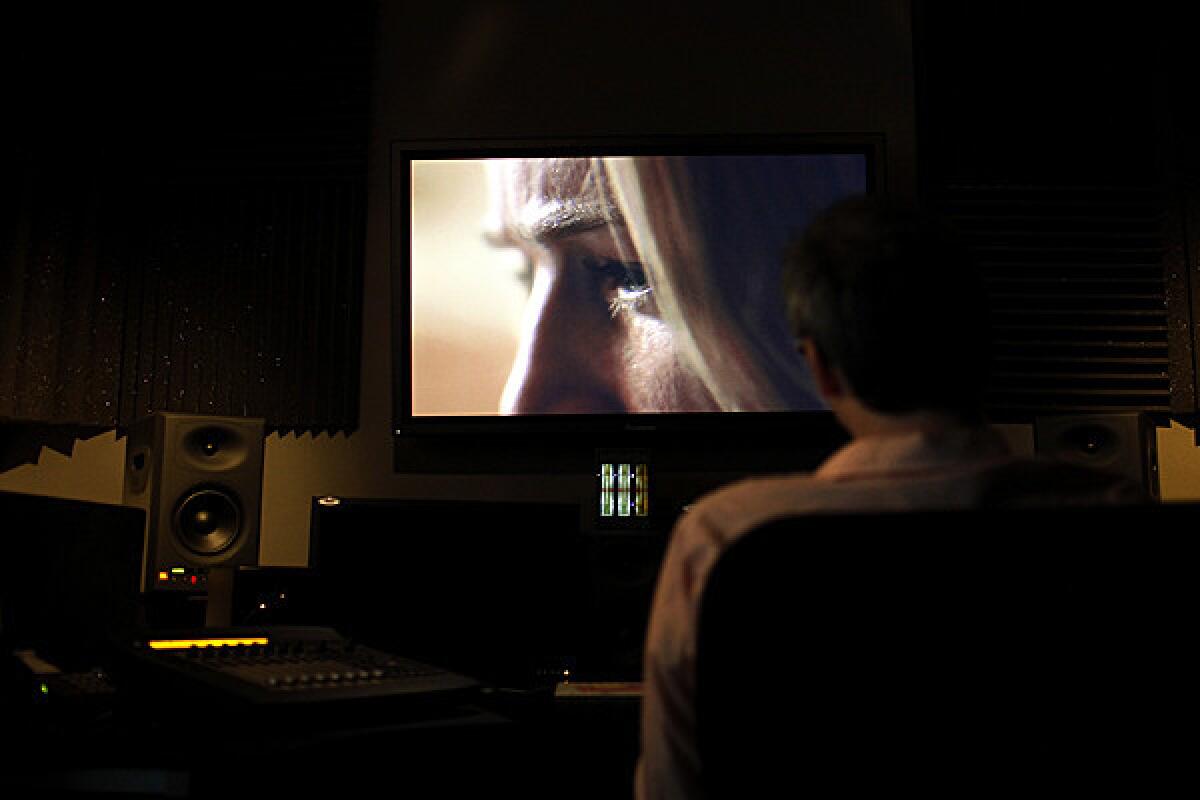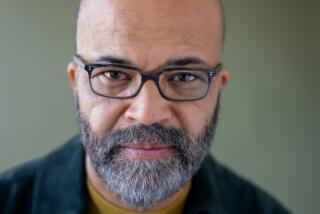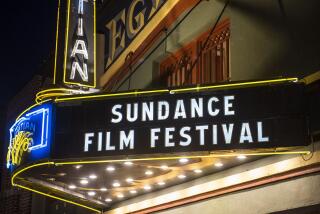Hollywood dream of filmmaker Nicholas McCarthy is stop and go

Nicholas McCarthy found himself in the Santa Monica offices of Content Media, an independent movie company, sensing that his life had reached a crossroads.
His 11-minute thriller had just played at the Sundance Film Festival in Park City, Utah. He had hoped the premiere would launch — finally, after so many failed attempts — his dream of making it in Hollywood. But he came home with only one offer of a meeting, from Jamie Carmichael, president of Content’s film division.
McCarthy, bookish in his black-rimmed glasses, was skeptical about his chances. In years of trying to sell scripts and concepts, he had been through plenty of meetings, and the end was always the same. No.
FULL COVERAGE: Chasing the dream
Carmichael, though, was to the point. “Maybe we can make this into a feature film,” he said. “Do you have a full-length script?”
McCarthy didn’t hesitate. “Sure,” he said. “It’s done. Just give me a few weeks to polish it.”
In fact, he had only a hazy idea of how he would transform the 11 minutes of “The Pact” into something much more.
McCarthy had reason to lie: This might be his last chance. He was 40, with a wife and baby. Like countless dreamers, he’d existed on the outskirts of Hollywood, fending off debt and doubt, staying afloat with low-wage jobs, diligently writing screenplays and making short films, hoping to hold on long enough to catch a break.
Each day, he drove to a little cafe in Atwater Village and spent hours there, typing, thinking, scribbling out plots, surrounded by actors and filmmakers chasing the same elusive prize.
The odds were daunting. All he had to do was look around to be reminded of Hollywood’s addicting allure.
At the cafe, a few had achieved success enough to make a good living. But most were grinding away like he was, lonely among the crowd.
He and his wife had talked about when he would give up.
He wouldn’t. Not now.
Early love of movies
When McCarthy was 8, he sat next to his big sister at a theater in their New Hampshire hometown, watching “Jaws.” It filled him with terror yet gut-busting laughter too. It jolted him with a force he’d never imagined.
“It was a roller-coaster ride,” he said. “I left ‘Jaws’ completely energized. And completely obsessed. That was the start.”
By junior high, he was drawn to edgy filmmakers like John Waters and David Lynch.
His father was a school principal, his mother a teacher, but he wasn’t much for schoolwork.
He’d be watching a film with his parents, turn to his mother and analyze the way a director used light in a particular scene to heighten the emotional power. He was 12.
Not surprisingly, he eventually got a film degree from Purchase College of the State University of New York and after that moved to New York City. He paid rent by tending bar, and grew consumed with a single movie, one he’d started as an undergrad.
“It sucked me in, the drive to finish that thing,” he said. He’d rent a clunky editing machine, lug it into his Queens apartment and spend weeks just splicing negatives.
McCarthy’s film was a mystery about a group of friends dealing with death. When it was done, he rented a theater and invited a small group to view it. Yet as he watched, he realized he’d made a flop. He took the film home, tucked it inside a box, and never played it again.
That’s why, in the summer of 2000, McCarthy moved to Los Angeles. New York had battered him. He was 29, with no job, no permanent place to live.
He slept on his sister’s couch for a while; she had moved here to work as a business executive. But he wanted none of that life. He found a $500-a-month apartment on Sunset Boulevard and struggled to pay his bills.
There were years without health insurance, months without work. In 2001 he was hired as an office assistant at a company making a video called “Flesh + Steel: The Making of RoboCop.” He got fired after six weeks.
His escape, as always, was the movies. When he wasn’t watching them (sometimes 10 a week), he was talking about making them.
“I was an aspiring filmmaker,” he said. “But I started to see how aspiring to be something was a way to not really try. If you did that and you failed, well, you didn’t really fail. I needed to start making things, even if they weren’t great, just making things.”
He started with a group of other cinephiles. They called themselves Alpha 60, a nod to a malevolent computer system in the 1960s Jean-Luc Godard film “Alphaville.” They would scribble ideas on scraps of paper, toss the scraps into a bowl, pull one out and get going — everyone pitching in, using borrowed equipment. They made dramas, oddball comedies and musicals. One short by McCarthy started in Spanish and finished in Korean.
Many of those films were shown at the Echo Park Film Center. One night, Mike Plante, a Sundance programmer, caught one of McCarthy’s movies. “There was something special about his work and it was apparent right away,” Plante said. “There was a style there.”
Encouraged, McCarthy wrote “Cry for Help,” a farcical short about a dead drug dealer who goes to heaven and meets Jesus, who turns into a zombie.
To pay for it, McCarthy and two friends sold tequila shots at parties and asked their families for donations. Finally they had enough: $15,000. McCarthy directed and edited the movie and sent it off to Sundance, which each year receives about 10,000 entries — short and feature-length — and ends up showing about 200.
“Cry for Help” played at the festival in 2005.
“I thought this was it, finally, my big break,” McCarthy said.
After the festival, a few movie executives asked to meet him. The meetings went nowhere. He wrote a script for a full-length thriller. The thriller went nowhere.
McCarthy was undeterred, even as people he’d known for years, people on the same moviemaking quest, were quitting.
He fell in love with a college friend, Alexandra Lisee, who produced television commercials. Her salary helped. They married in 2007 and not long after that she was pregnant. Suddenly he had real responsibility.
She was supportive, but the two argued over how long he should keep going.
Clinging to his dream, relying on volunteers and cashing in favors, he made another short film, “Chinese Box.” It cost $300 and focused on a conversation between two people at a restaurant.
“Chinese Box” played at Sundance in 2009.
But nothing came of it. As he had for years, McCarthy holed up month after month at a pair of local cafes, tuning out distractions, working on scripts. He approached it as if he were a professional. But was he? Since college, the entirety of his film work hadn’t netted him more than $30,000. He still couldn’t get a bigger project off the ground.
Depressed and unsure, he sat in his apartment for days, watching classic movies to inspire himself again.
“I know you’ve heard it all before, but I have to try one more,” he told his wife. “Please let me put it on the credit card and make this movie.”
The result was “The Pact,” a haunting short that follows a woman struggling to deal with a traumatic past after her mother’s death — and the mystery behind a locked basement door. He submitted it to Sundance. Last January it became the third McCarthy work to play there, late at night, at Park City’s Egyptian Theater.
Content Media’s Carmichael was in the audience, but not to see McCarthy’s movie. He was there for a feature film. “I had never even heard of Nick McCarthy or his film,” he said. “But then the movie began and within two minutes the whole room was like, ‘Whoa, hold on, this is scary, this is a movie.’”
When McCarthy came home to Los Angeles, he looked at his wife and his daughter, Agatha, and he thought to himself: What am I going to do with my life now?
Then came his meeting with Carmichael.
Six weeks, countless coffees
McCarthy spent much of last February and March at Kaldi Coffee & Tea in Atwater Village.
He arrived each day in the early morning, ordered coffee with cream, stuck a dollar bill in the tip jar, spread out his work on a metal table and began plowing ahead, often not going home until night.
He used a pen to scratch out a plot in two notepads, and then, finally, began typing on his laptop.
Some days, the story went nowhere. He’d rise from his spot and walk through nearby neighborhoods, talking out loud as he thought through scenes. He’d come back to his hard seat, look around at the other writers, chat for a while about movies and then get back at it.
It took six weeks and countless coffees for him to finish.
Carmichael loved the screenplay and his company arranged financing. McCarthy directed and edited the film last summer and fall.
At midnight Friday, “The Pact,” now 89 minutes long, will premiere at Sundance. If all goes well, a distribution deal will be next.
“I’ve had this dream for so long and now it could be realized and that’s sort of unreal,” McCarthy said. “It feels like I’m standing at the edge of this abyss and there’s this map in front of me that has success on it.”
More to Read
Start your day right
Sign up for Essential California for news, features and recommendations from the L.A. Times and beyond in your inbox six days a week.
You may occasionally receive promotional content from the Los Angeles Times.







